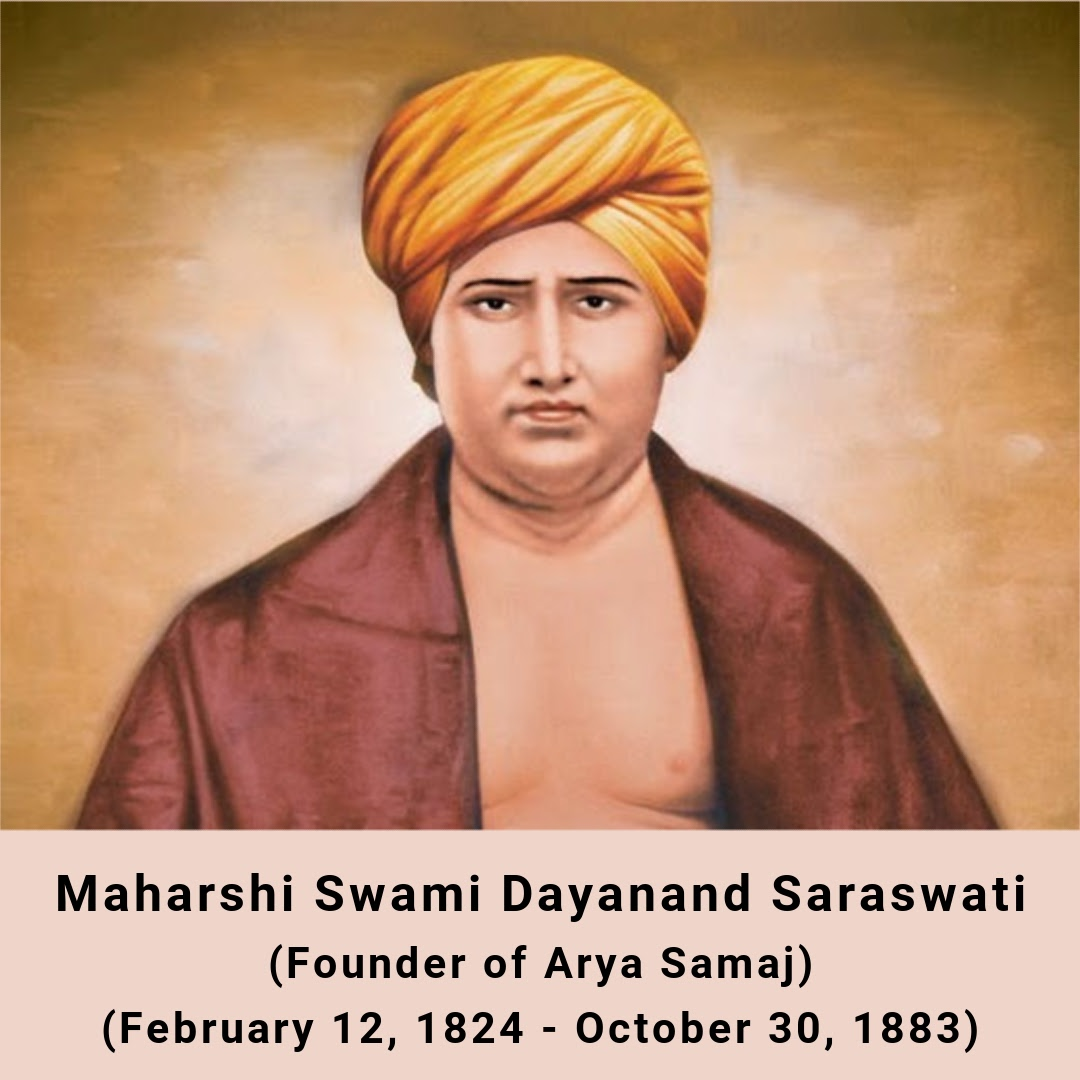Indian History
Birth Anniversary of Swami Dayanand Saraswati
- 15 Feb 2025
- 5 min read
For Prelims: Maharishi Dayanand Saraswati Jayanti, Arya Samaj
For Mains: Maharishi Dayanand Saraswati and his Contribution, Important Personalities, Guiding principles of the Arya Samaj.
The Prime Minister paid tributes to Swami Dayanand Saraswati (1824-1883) on his 201st birth anniversary on 12th February 2025. He was a great thinker, ardent nationalist and founder of the Arya Samaj.
Who was Maharishi Dayanand Saraswati?
- About:
- Maharishi Dayanand Saraswati was a prominent social reformer, philosopher, and religious leader of the 19th century.
- Birth and Early Life:
- He was born as Mool Shankar Tiwari on 12th February 1824 in Tankara, Gujarat, into an orthodox Brahmin family and his parents, Lalji Tiwari and Yashodabai, were devout followers of Hindu traditions.
- At a young age, he developed a deep interest in spiritual knowledge and questioned idol worship, rituals, and superstitions.
- Renouncing worldly life at 19, he wandered as an ascetic for nearly 15 years (1845–1860) in search of truth.
- He studied under Swami Virjanand in Mathura, who urged him to work towards purging Hinduism of corrupt practices and restoring the true meaning of the Vedas.
- Philosophy and Social Reforms:
- He opposed idol worship, untouchability, caste-based discrimination, polygamy, child marriage, and gender inequality.
- He believed in a classless and casteless society where caste was based on merit rather than birth.
- He strongly advocated for women's education, widow remarriage, upliftment of depressed classes, Shuddhi movement for reconversion and the abolition of Sati and child marriage.
- He emphasized "Back to the Vedas", arguing that true Hinduism is rooted in the Vedas, which uphold rationality, equality, and social justice.
- His ideas were compiled in his seminal work, Satyarth Prakash (The Light of Truth), where he criticized social evils like infanticide and dowry and advocated Vedic wisdom.
- Educational Contributions:
- He advocated for modern, scientific, and Vedic education while opposing the British colonial education system.
- Inspired the establishment of gurukulas, Girl’s Gurukulas and Dayanand Anglo-Vedic (DAV) schools and colleges in 1886, with the first DAV school set up in Lahore under Mahatma Hansraj.
- Role in Nationalist Movement:
- He was the first to give the call for "Swaraj" in 1876, influencing later leaders like Bal Gangadhar Tilak, Lala Lajpat Rai, and Mahatma Gandhi.
- He promoted Swadeshi (economic self-reliance), cow protection, and Hindi as a national language.
- Legacy:
- Swami Dayanand Saraswati faced resistance from the orthodox sections of society for his efforts in socio-religious reform. However, he left behind a lasting legacy through institutions like Arya Samaj and DAV schools, which continue to have a positive impact on society.
What is Arya Samaj?
- About:
- Arya Samaj (Society of nobles) is a Hindu reform movement that promotes the Vedas as the ultimate source of knowledge and truth.
- It was founded by Swami Dayanand Saraswati in 1875.
- Core Beliefs and Principles:
- Emphasizes Vedic authority and rejects idol worship, priestly rituals, animal sacrifice, social evils and superstitions.
- Supports karma (law of deeds), samsara (cycle of rebirth), and the sanctity of the cow.
- Promotes Vedic fire rituals (havan/yajna) and samskaras (sacraments).
- Social Reforms and Contributions:
- Advocated female education, inter-caste marriage, and widow remarriage.
- Established schools, orphanages, and widow homes.
- Played a role in famine relief and medical aid.
- Led the Shuddhi Movement to reconvert those who had embraced other religions.
What were the Major Social and Religious Reform Movements of the 19th Century?
UPSC Civil Services Examination, Previous Year Questions (PYQs)
Q. Which among the following events happened earliest? (2018)
(a) Swami Dayanand established Arya Samaj.
(b) Dinabandhu Mitra wrote Neel Darpan.
(c) Bankim Chandra Chattopadhyay wrote Anandmath.
(d) Satyendranath Tagore became the first Indian to succeed in the Indian Civil Services Examination.
Ans: (b)





